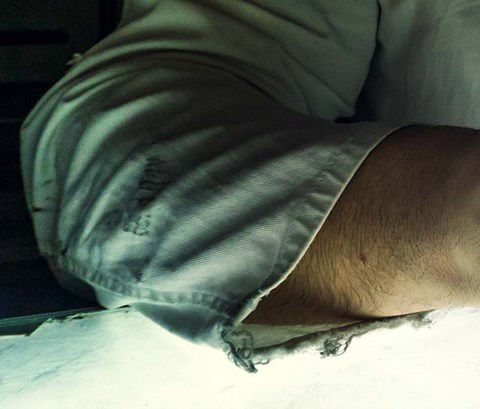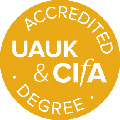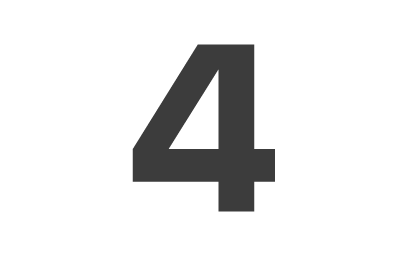
Archaeology BA, DipHE, CertHE, by distance learning
1-6 years
Our distance learning courses allow you to study archaeology no matter where in the world you live. The courses are designed to allow you to either study full time or to fit your studies in alongside work and family commitments in a way that works for you. In our distance learning archaeology qualifications you can learn all about the practice of archaeology and how it can be used to make sense of millions of years of human history.
Course information
Taught by Archaeology and Ancient History

Accredited by CIfA/UAUK

Ranked 4th in the UK for subjects aligned to Archaeology for ‘overall positivity’ in the NSS 2025. (Based on University of Leicester analysis using the Times Higher Education NSS 2024 methodology applied to the NSS 2025 data of aligned subjects)

5th in the UK for research quality in Archaeology (Complete University Guide 2026)

11th in the UK for Archaeology and Forensic Science (The Times UK University Rankings 2026)
Admissions and course enquiries
+44 (0)116 252 5281
Submit a course enquiry
Course description
Course description
This course will introduce you to key themes in the study of archaeology and enable you to further your knowledge of the wide chronological and geographical range of the discipline. You will develop your ability to draw upon appropriate archaeological theories, methods, techniques and concepts in order to develop your understanding of the past.
We have been successfully teaching distance learning courses to students around the world since 1996. This course is based on our extensive experience in developing and teaching archaeology and our world-leading research. Our modules are designed to inspire you and enable you to gain a wider knowledge of your chosen topic.
We will provide you with an intellectually challenging and stimulating curriculum that draws on the expertise of staff from the School of Archaeology and Ancient History. We have a proven track record of successfully delivering distance learning courses that will help you gain the transferable skills necessary for successful career development or further academic study. As a result, our courses are highly valued by employers, who recognise the key transferable and subject-specific skills gained.
Throughout your degree there are several opportunities for you to develop and enhance your practical skills through fieldwork and laboratory work.
This course is the only distance learning Archaeology degree in the UK to receive joint accreditation from the Chartered Institute for Archaeologists (CIfA) and the University Archaeology UK group (UAUK), providing a recognised path to professional archaeological careers.
What's the difference?
BA/Diploma/Certificate
If you know from the outset that you can’t, or don’t want to, commit to a full BA, you can apply for the Certificate or Diploma only. Similarly, if for any reason, after you have applied, you are unable to complete the full BA course, you can opt to leave at the end of Level 1 with a Certificate or at the end of Level 2 with a Diploma.
Levels and Qualifications
- Level 1 - Certificate (1 year full-time, 2 years part-time)
- Levels 1 and 2 - Diploma (2 years full-time, 4 years part-time)
- Levels 1, 2 and 3 - BA (3 years full-time, 6 years part-time)
If you have studied Archaeology at undergraduate level before, it may be possible for you to transfer the credits from your previous study. For example, if you already hold a Certificate in Archaeology, you may be able to enter the courses at the Level 2/Diploma stage. In order for us to assess your eligibility to transfer credits, we will need to see a transcript of any credits you have achieved to date, showing the title of all modules and the marks/grades awarded.
Taster module
Perhaps you don’t want a formal qualification, but would just like to study archaeology or ancient history for interest? It's possible to study the Level 1 module Aims and Methods in Archaeology without registering for a formal qualification. Successful completion of this taster module will entitle you to a transcript formally recording your achievement and you may be able to count the credits achieved on that module towards further undergraduate study at Leicester or elsewhere at a later date.
Entry requirements
Entry requirements
Our distance learning undergraduate courses are all completely open access – anyone can join the course as long as they meet English language requirements. This means that we are able to offer qualifications to a far wider range of students than on a traditional campus-based degree.
You need three key things to study with us: first, you need to be passionate and self-motivated. Second, you need to have access to a computer with a good internet connection. You need to be able to use that computer and have some basic IT skills including the ability to access websites, use email, and create a typed document. Third, you need to be able to spend between 12-15 hours a week studying part time, or 24-30 hours a week for full time. It is important to remember that students work at different speeds and have different strengths so these figures are just a guide but making sure you have the time to commit to studying is key.
English Language Requirements
IELTS 6.5 or equivalent. If your first language is not English, you may need to provide evidence of your English language ability.
International Qualifications
Find your country in this list to check equivalent qualifications, scholarships and additional requirements.
Countries listFees and funding
Fees and funding
UK Students
Starting in February 2026
- BA: £21,390
- Diploma: £14,350
- Certificate: £7,275
- Taster module: £1,250
Find out more about how to pay and scholarships and funding.
International Students
Starting in February 2026
- BA: £21,390
- Diploma: £14,350
- Certificate: £7,275
- Taster module: £1,250
Find out more about how to pay and scholarships and funding.
Careers and employability
Careers and employability
Our courses are designed to enable you to develop your skills and knowledge, whether to enhance your career prospects, proceed to further study, or for general interest.
Our modules cross the traditional academic boundaries of archaeology and ancient history, enabling you to gain a wider knowledge in your chosen area.
Employability skills are embedded throughout our curriculum. You will develop research and IT skills as well as critical thinking.
In addition, we offer our Distance Learning students a chance to take part in our Internships program gaining real-life valuable experience working with heritage bodies while they are still studying.
Our Careers and Employability Service is here to support you – by email, phone or skype – with advice on interviews, CVs, work experience and more. From registration to Graduation and beyond, they are here to help you reach your professional goals.
How does distance learning work?
How does distance learning work?
Our courses are designed to work for a global audience of students who often lead busy lives. They are delivered by expert academic staff (the same people who teach our campus based courses!). You work remotely at your own pace. You will be given access to our Virtual Learning Environment where all the materials for whichever module you are currently studying will be accessible as well as a student forum with overarching information about our courses.
Students can start their studies at two different points in the year, either in September or February. They can study part time taking one module at once, or full time studying two modules at a time. You can pause your studies at the end of a module if you need to.
The teaching semester is divided into two halves of 6 weeks. There will be 6 sections of material to work though, then you will pause to complete your first assessment. This is followed by a further 6 sections of material before you complete your final assessment. There are no set times when you need to attend class or complete your study work except for assessment deadlines. This means you can fit your studies around your work and family life in a way that works for you whether that is studying in the evenings, at the weekend, or during the daytime.
Each module has its own space in the Virtual Learning Environment where our staff have designed content to help you learn. This might include recorded lectures, guided readings, exercises to complete, podcasts, discussion boards and optional live sessions: each module is different! These materials will guide you through the module content. Each module has a module co-ordinator who is responsible for the delivery of the module. You will hear from them regularly as they guide you through your learning. You will also have access to an e-reading list where all the key sources for the module are linked. In addition, you will also have access to our university library, which has masses of digital resources you can access online - but they’ll also post you physical books too. In addition, they are able to provide lots of help and support, from finding resources to improving your academic skills.
Course structure
Level 1
Level 1
Full-time Year 1; Part-time Years 1 and 2
The BA in Archaeology is made up of three levels, with each level taking two years for part-time students to complete, or one year for full-time students.
Each level consists of four modules, lasting 14 weeks each, with breaks in between. Part-time students study each module in turn, whereas full-time students study two modules at a time.
Core modules
- Aims and Methods in Archaeology (also available as a stand-alone taster module)
- Archaeology BCE
- Introduction to Classical Archaeology
- Archaeology CE
The modules listed reflect those currently available to students. Every year, we review our modules and their content to ensure that our courses maintain the best academic and student experience possible. Whilst this does mean elements of your course may change in future academic years, it ensures your course is giving you a research-inspired education and preparing you for your future.
Level 2
Level 2
Full-time Year 2; Part-time Years 3 and 4
Core modules
A choice of either
Choose one optional module from:
- Archaeology of Human Evolution
- Neolithic, Bronze and Iron Age Britain and Ireland
- Archaeology of the Roman World
- Medieval Mediterranean
The modules listed reflect those currently available to students. Every year, we review our modules and their content to ensure that our courses maintain the best academic and student experience possible. Whilst this does mean elements of your course may change in future academic years, it ensures your course is giving you a research-inspired education and preparing you for your future.
Level 3
Level 3
Full-time Year 3; Part-time Years 5 and 6
Core modules
A choice of either
Choose two optional modules from:
Plus your Dissertation
The modules listed reflect those currently available to students. Every year, we review our modules and their content to ensure that our courses maintain the best academic and student experience possible. Whilst this does mean elements of your course may change in future academic years, it ensures your course is giving you a research-inspired education and preparing you for your future.
Why Leicester?
Students from more than 25 countries have chosen to study archaeology by distance learning with us.
Our distance learning courses are written and taught by academic staff with specialisms in the subject area. All our teaching is informed by our own original research.
We are the world leaders in archaeology and ancient history courses by distance learning. This is not just a marketing boast – we have been teaching students by distance learning for nearly 20 years.
Teaching and learning
Each module consists of specially prepared self-study materials, which are made available online through Blackboard, our virtual learning environment, and supplemented by our Library's online materials and book-loans-by-post service.
We recommend that you set aside 12-15 hours study time per module per week. Each module has a module co-ordinator who will be in regular contact with you. They will be available via email or online call to provide advice on academic and study matters.
Wherever you are in the world, you will have access to University services, including the University’s David Wilson Library and its extensive range of electronic journals and e-books.
We provide excellent learning support, delivered by the same expert archaeology academics and professionals as our on-campus courses.
Because we understand that many of our students are combining study with demanding careers and family lives, we provide a range of entry and exit points onto our courses, along with the opportunity to move between full-time and part-time study if circumstances change.
Assessment
Modules are assessed by a variety of types of coursework. This includes written coursework, usually in the form of essays or reports as well as posters, site studies, and exercises. There are no examinations and no requirements for you to attend the University campus for assessments.
In addition to your modules you will need to complete fieldwork.
Field School and Research Bootcamp
The compulsory Level 2 Field School module gives you the opportunity to get practical, hands-on experience in a number of aspects of survey and excavation. You can participate in the week-long field school that we organise each year in Leicestershire, or opt to make your own fieldwork arrangements.
At level 3 you will take a Research Bootcamp module to prepare you for your dissertation. You can either come to campus for this and have a week-long practical laboratory-based experience at the University of Leicester or you can take this module remotely like your other modules.
Key dates
Start date: 2 February 2026
Application deadline for February 2026 start: 12 January 2026
Apply now
| Course | Qualification | Duration | Start Dates | Availability |
|---|---|---|---|---|
| Course Archaeology | Qualification BA | Duration 3 years full-time | Start Dates February and September each year | Availability Apply Now |
| Course Archaeology | Qualification BA | Duration 6 years part-time | Start Dates February and September each year | Availability Apply Now |
| Course Archaeology | Qualification DipHE | Duration 2 years full-time | Start Dates February and September each year | Availability Apply Now |
| Course Archaeology | Qualification DipHE | Duration 4 years part-time | Start Dates February and September each year | Availability Apply Now |
| Course Archaeology | Qualification CertHE | Duration 1 year full-time | Start Dates February and September each year | Availability Apply Now |
| Course Archaeology | Qualification CertHE | Duration 2 years part-time | Start Dates February and September each year | Availability Apply Now |
| Course Aims and Methods in Archaeology | Qualification Taster module | Duration 4-8 months part-time | Start Dates February and September each year | Availability Apply Now |

Having that connection with the physical remains of the past really captures the imagination.

